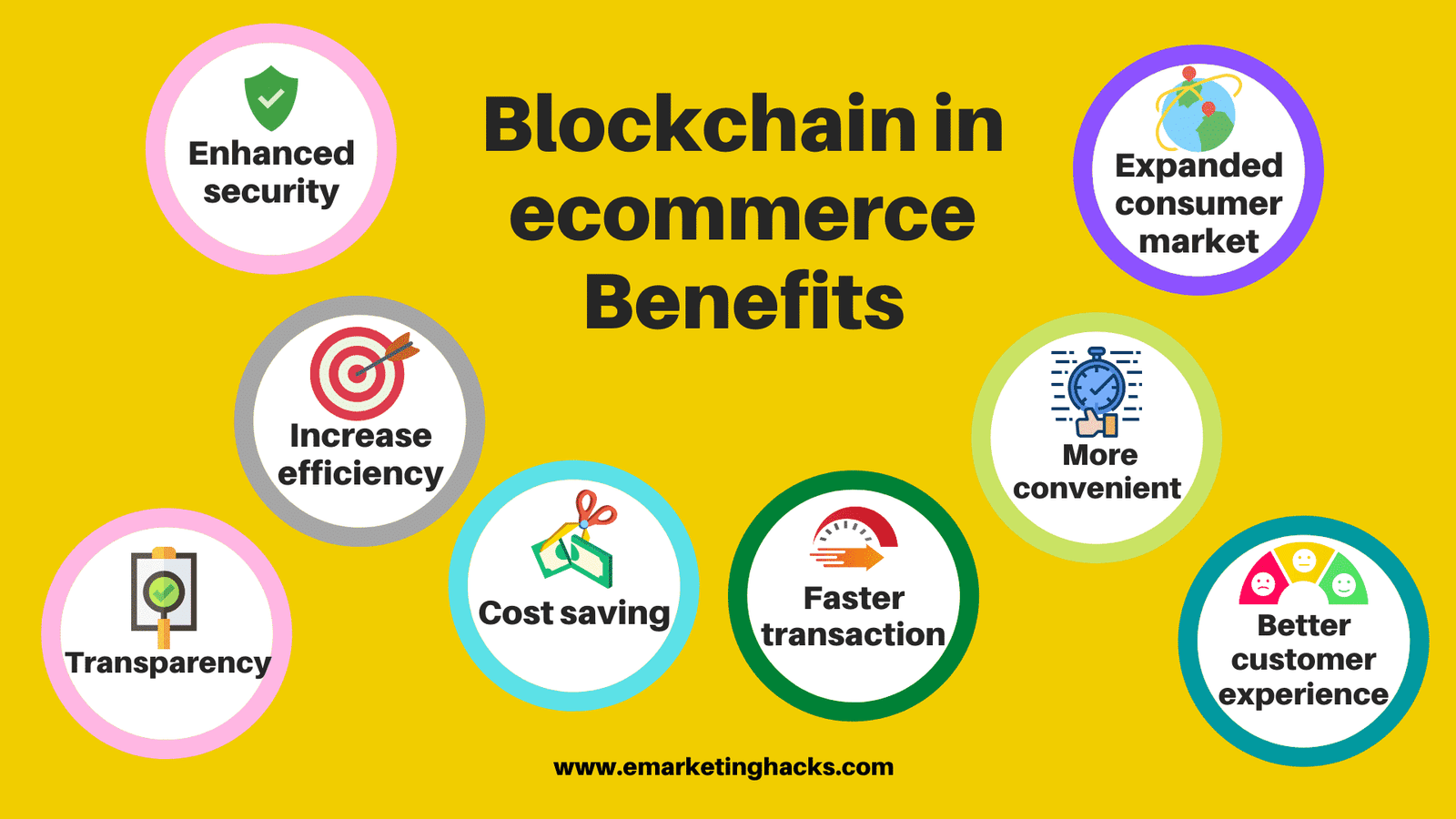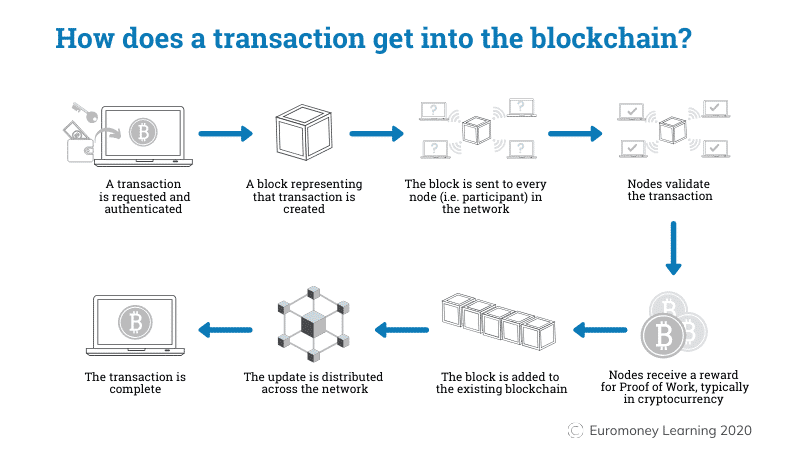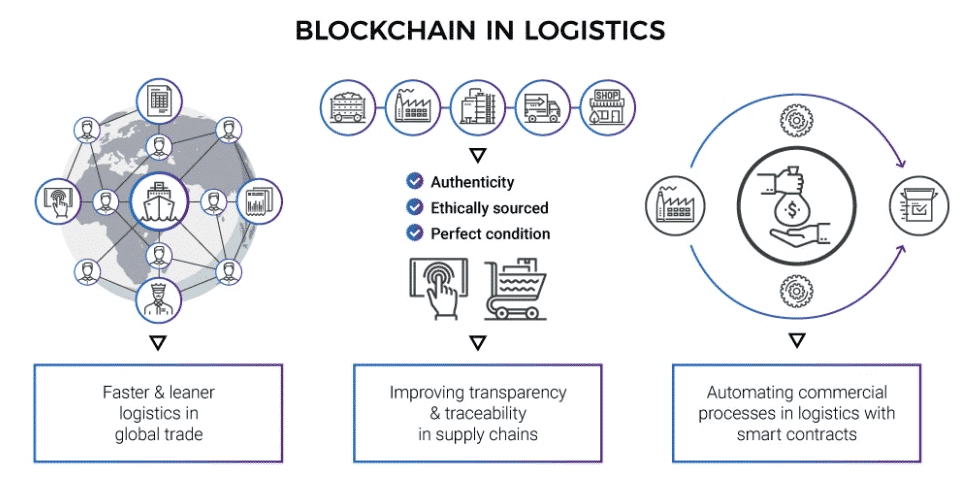Blockchain in e-Commerce - Blockchain is the technology that powers Bitcoin and other cryptocurrencies. Find out how it can be applied to eCommerce in this article.
For quite some time, blockchain has had a terrific run in the financial business. Every day people and companies from all over the world make millions of transactions to buy bitcoin and sell it, etc...
As the blockchain market grows with every passing year, evident through the statistics, it is simultaneously inching closer to real-world applications.
An increasing number of people are discussing various prospective use-cases for the technology outside of finance, particularly in the most profitable of all – eCommerce.
The eCommerce business has changed the way we shop and live, and blockchain is about to do the same. The blockchain will spark a dramatic transformation in the eCommerce industry.
By developing a decentralized economy. So let’s dive straight into how this technology enables a decentralized economy and its effect on the eCommerce realm in the upcoming year.
Understanding Blockchain

Blockchain and its applications were invented back in 2008, but have become quite a hot topic these days. You hear this word at least once throughout the day. However, the topic is still new when it comes to integration with the eCommerce industry.
Blockchain can be defined as :
The network that holds the transactional records of the public in multiple databases in a network that is connected through peer-to-peer nodes. The log of transactions is known as the “block” and the network of several databases is known as the “chain”. Recording the logs in this manner is termed a “digital ledger”.
You may be wondering, what’s so special about keeping this digital ledger after all?
Let’s dive deeper. Each transaction registered in this ledger is authenticated and authorized by the owner’s digital signature. This ensures that all the transactions are safeguarded from any kind of tampering.
The digital ledger can be compared to a Google spreadsheet shared with a plethora of systems in a given network. The most fascinating aspect is that anyone and everyone can see the transactions, however, cannot corrupt them.
The Mechanism Behind the Technology
People are frequently perplexed by blockchain technology's principle. A unique "block" is formed and bound to the "chain" as new data is periodically added to the grid.
The way these new blocks are produced is one of the reasons why blockchain is regarded as extremely safe. A majority of nodes must review and certify the authenticity of new data before a new block can be added to the ledger.
They could involve checking that new transactions in a block aren't fraudulent or that currencies haven't been spent in a coin more than once. A standalone database or spreadsheet, on the other hand, allows a single person to make changes without the need for approval.
The block is recorded on the blockchain and the constituent transactions are logged in the distributed ledger once there is consensus. From the inception of the ledger to the present, blocks are safely chained together, producing a secure digital chain.
The nodes need to solve intricate mathematical problems to finish a transaction. This is called cryptography, which secures all the transactions.
Nodes are often rewarded with fresh amounts of the blockchain's native currency — for example, new bitcoin on the bitcoin blockchain — as a reward for their work in validating modifications to the shared data.
Let’s have a look at an overview of the step-by-step process for a better understanding.
Blockchain in eCommerce
As the benefits of blockchain applications like cryptocurrency become common knowledge, online merchants and buyers find ways to incorporate them into the online shopping arena.
eCommerce is slowly being associated with the emerging blockchain technology in more ways than one. Secure and quick transactions seem to be one of the fundamental connecting links between them.
User actions such as money transfers, product searches, product purchases, and customer service can all be handled by this technology.
This technology was largely enabled by bitcoin, a cryptocurrency.
It is used by customers to make purchases at certain online retailers that accept Bitcoin as a form of payment. In addition to Bitcoin, Ethereum is another widely used blockchain technology in the eCommerce business.
You can use any of the best Ethereum wallets that have the framework suitable for your online business for seamless integration.
Benefits of Blockchain in eCommerce

The appealing aspect of blockchain technology in e-commerce is that it benefits both parties, the sellers as well as the buyers.
It provides simple solutions to the dangers and apprehensions about security in the online world. Here are a few advantages of integrating this technology in an eCommerce undertaking.
Cyber Threats
Online stores are already striving hard to keep up with competition and meet the customer’s ever-expanding demands. On top of these challenges, they are also prone to cyber invasions, which could result in the displacement of consumer data and large sums of money.
The issues that eCommerce companies face are ideal prospects for problems that could precisely be solved by blockchain technology. Blockchain provides the highest level of security for eCommerce database management systems through the means of distributed ledgers.
Data breaches and fraudulent transactions have posed an important problem for online shops since the onset of the industry.
According to PWC’s annual Global Economic Crime and Fraud Survey 2020, 47% of companies experienced fraud in the past 24 months with a total of $42 billion lost.
Blockchain technology enables multiple parties to verify a person's identity and provides the highest level of security for customer databases and CRM systems.
Cost Reduction

E-commerce companies can easily link inventory management, payment processing, product descriptions, and photos with other business processes using blockchains.
They save money by not having to spend as much on maintaining the systems that support these activities or on paying IT support workers to maintain the systems.
Cryptocurrencies reduce the fees that banks charge for facilitating transactions. This is because cryptocurrencies can be sent instantly peer-to-peer, eliminating the need to go through banking systems.
Boosting Trade in Third-world Countries
One of the most compelling reasons for online retailers to adopt blockchain into their operations is the increased access to a global audience.
The ability of third-world countries to trade online thanks to blockchain technology is fantastic.
Because of Bitcoin's peer-to-peer method, consumers in these countries don't need a middleman to complete their payment requests. Furthermore, these technologies enable online businesses to reach out to consumers in undeveloped countries.
Shoppers from underdeveloped countries do not necessarily have access to a protected banking system. They can skip the banking middleman with blockchain and cryptocurrencies, providing them access to a wider range of eCommerce shops.
It also enables forward-thinking companies to enter new and emerging markets. It also makes it possible for forward-thinking businesses to penetrate new and emerging markets.
Fast Transactions

Shoppers interacting with various eCommerce sites can make quick online payments using blockchain technologies.
Online transactions used to take hours or days to get processed in the past. However, blockchains now provide the buyers with the convenience they desire while purchasing online.
The users can successfully place an order immediately and have their things dispatched quicker than before.
There are no delays in payment processing or pending transactions because blockchain transactions are almost immediate and do not go via traditional institutions. Customers benefit from speedier eCommerce order fulfillment because purchases can be made quickly.
Related: 80+ Popular Blockchain Games to Play and Earn
Popular trends in 2022
More and more eCommerce companies are tapping into the potential of blockchain to secure payments, track shipments, and even build loyalty programs. Let us have a look at some of the popular blockchain trends that are set to rule the eCommerce industry in 2022.
Payment Options
As we have learned, a blockchain is used by cryptocurrencies to keep track of their transactions.
The cryptocurrency inherits the blockchain's safe transaction benefits without the need for a middleman — such as banks or payment processors — as many mainstream currencies and transactions do.
This lowers the transaction cost significantly, making bitcoin and other cryptocurrencies more affordable for both businesses and consumers.
With the adoption of bitcoin and other cryptocurrencies by an increasing number of online merchants, physical venues, and customers, accepting cryptocurrency as payment has gotten easier.
Over one-third of small businesses in the US accept crypto transactions, and the number is only set to rise this year.
Expedia, Overstock, and Microsoft, as well as thousands more Shopify business owners in several retail categories, all accept bitcoin, making bitcoin accessible to a wider range of customers.
Low or no processing fees, no chargebacks, international use, and simple setup are all advantages for retailers.
Accepting cryptocurrencies is as easy as opening an account with a bitcoin processor, the most popular are BitPay and Coinbase, and integrating them into your eCommerce site.
For the most part, the processor creates a cryptocurrency wallet for you to store your assets in and assists you in converting your cryptocurrency to US dollars (or your local currency).
Merchants should engage their accountant, as they do with anything payment-related, to discuss their knowledge and comfort level with cryptocurrency payments, as well as whether they have any recommendations particular to the merchant's business.
Smart Contracts
You can think of smart contracts as programs that run only when certain benchmarks are satisfied.
These contracts are preserved on a blockchain. They're often used to automate the execution of an agreement so that all parties can be certain of the conclusion right at once, without the need for an intermediary or time wasted.
They can also automate a workflow, starting the following step when certain circumstances are satisfied.
Smart contracts function on a blockchain through straightforward "if/when...then...". As and when the pre-established stipulations are fulfilled and verified, the activities are carried out by a network of computers.
These actions could include sending payments to suitable parties, providing alerts, issuing a ticket, or registering a vehicle.As soon as the transaction is complete, the blockchain gets updated. That means the transaction can't be modified, and the results are only visible to those who have been granted access.
As an eCommerce store owner, you can keep as many specifications as needed in a smart contract to convince the buyers that the task will be executed correctly.
Parties must agree on how transactions and associated data are represented on the blockchain, agree on the "if/when...then..." rules that govern those transactions, investigate all conceivable exceptions, and design a framework for resolving disputes in order to set the terms.
Here’s a well-known example, Home Depot employs blockchain-based smart contracts to efficiently resolve vendor issues. They are strengthening connections with suppliers through real-time communication and better insight into the supply chain, resulting in more time for vital work and innovation.
Loyalty Programs and Personal Offers

With the takeoff, marketing, and incentive expenditures skyrocketing by the hour, loyalty programs can have a negative influence on a retailer's bottom line.
Blockchain technology, as a decentralized public ledger, can be a cost-effective way to store and exchange reward point activity and balances. Unlocking this information may provide consumers with extra opportunities to be aware of and spend their points, so reinforcing brand loyalty.
The purpose of rewards programs is to entice customers to make more purchases. Companies are beginning to replace point-based systems with crypto tokens, as seen by Rakuten's recent statements. They're converting their loyalty points systems to coins based on the blockchain.
Loyalty programs can also give businesses a wealth of information about their customers, allowing them to personalize products, services, and marketing efforts to their specific needs. Consumers, on the other hand, are more cautious than ever about disclosing personal information.
This sensitivity will almost certainly rise. Retailers can construct their own private blockchain to better protect customer data, or they can collaborate with one of the many initiatives developing the technology around the world.
Supply Chain Monitoring
Executing blockchain to minimize the cost and complexity of the supply chain has become a widespread application.
Many of the world's major merchants have adopted or are exploring blockchain for this purpose. The blockchain is used by the majority of these merchants to remove the paper and manual effort associated with international goods shipping.
Data from a bill of lading for cargo shipments, for example, can be manually or automatically entered on the blockchain at each stage of the supply chain, eliminating the time-consuming and costly administrative process of permissions and reception guarantees.
This allows all partners to watch the shipment's progress, validate product information (such as pallet weight) at each step, and be confident that the information is correct and reliable.
Smaller shops may have similar cost-cutting opportunities, but it may not be worth the effort to get your suppliers on the blockchain just yet.
However, for merchants who offer one-of-a-kind products where authenticity is important, or higher-risk items that could be tampered with or have expiration dates, the blockchain can assist in authenticating the validity and quality of their inventory, assuring customers that they are getting what they pay for.
Generating Genuine Reviews
No matter if they are positive or negative, reviews can influence the order in which a company appears on an eCommerce marketplace or in a search query result.
The reliability of most product and service reviews found on the Internet is being questioned. The legitimacy of a company's reviews determines its reputation, necessitating the usage of blockchain technology by e-commerce platforms in the future.

Almost 4% of reviews on sites like Amazon, TrustPilot, and Yelp are fake, which accounts for an economic impact of approximately $152 billion. Such reviews degrade a respectable company's reputation while simultaneously promoting a phony one. The validity of an internet business's reviews determines its reputation.
As a result, the majority of online merchants are becoming increasingly concerned about product service reviews available on the internet.
As a result, blockchain technology has become a critical source for verifying customer reviews of their products or services. Since blockchain stores data in blocks, which are subsequently added to a chain of comparable information blocks, it can assist combat fraudulent reviews.
Before being added to the chain, each block must be validated across a network of computers; once verified, it cannot be changed. Before being added to the chain, each block must be validated across a network of computers; once verified, it cannot be changed.
Channel Expansion

Blockchain and cryptocurrencies have ushered in a new era of decentralization in eCommerce, allowing anybody to list things for sale. Many of these marketplaces are specialized in one or two areas.
Rare Bit is one such example. It is a crypto-collectibles marketplace that aims to be a cryptocurrency fueled Amazon equivalent with zero fees.
The amount of transactions on these decentralized markets pales in contrast to traditional eCommerce volumes, and the user interfaces for merchants and customers are both lacking.
However, merchants who wish to reach out to a cryptocurrency-savvy audience or grow their retail channel and enjoy a decentralized approach can use the marketplaces.
Influencers famous on an array of social media platforms are vital to the development of e-commerce platforms, and their work should not be overlooked.
Paying such creators is one of the interesting things that blockchain technology has in store for e-commerce businesses in the future. This means that thanks to blockchains, content curators will be able to earn digital tokens for creating and posting interesting material on these platforms.
Parting thoughts
The eCommerce marketplace is set to be transformed by Blockchain technologies. Even though we may have to wait for a stretch to see these changes, they are unquestionably on the way.
Aside from being speedier and cheaper, blockchain allows most of the actions that current commerce systems allow without involving a third party, making it suitable for shops. Finally, blockchain technology can be considered the backbone of the online sector.
Related :





